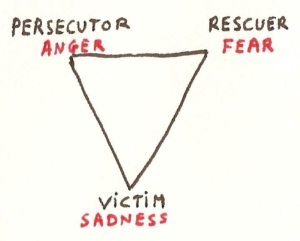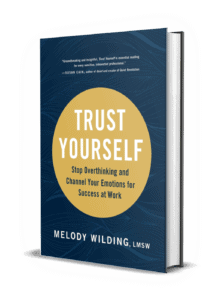Are you caught in the Drama Triangle?
Conflict is a necessary and unavoidable part of any relationship. But you may feel like some problems or dynamics seem intractable. That is, no matter what the issue, you and your co-worker, boss, family member, or friend, seem to fall into the same patterns again and again.
It can be frustrating — and tiring— to be trapped in this cycle. It’s important to realize that you’re not cursed, weak, or doomed to dysfunctional relationships forever. You’re simply caught in the Drama Triangle.
What is the Drama Triangle?
The drama triangle is a model of human behavior first described by psychologist Stephen Karpman in the late 1908s. It explains the unconscious, counterproductive roles people typically take on (and switch between) in stressful, high-conflict situations.
The drama triangle is possible in any relationship, whether at work, at home, or in friendships. They are more common in close relationships including those with romantic partners, family, and co-workers. The behaviors may play out in extreme or subtle ways. When you’re caught in this toxic dynamic, you end up with unnecessary aggravation and it drains your well-being.
DramaTriangle Roles
There are three roles we can play within the drama triangle:

1 – THE VICTIM
When problems arise, the victim looks helplessly inward. “Woe is me,” “help me,” or “poor me” are common refrains of the victim.
Put simply, Victims feel powerless. As a result, they struggle to take ownership of their lives and actions. They can’t make decisions or solve problems independently. Instead, they outsource responsibility to others. They seek sympathy by telling embellished stories about their pain or the wrongdoing they’ve experienced.
When problems arise, victims spin small stressors (like, say, getting negative feedback) into an outsized disaster (“I’m definitely getting fired! What will I do?”). Experts are careful to distinguish acting out an identity of victimhood in the drama triangle as separate from victimization as a result of abuse, discrimination, or crime.
2 – THE RESCUER
Also known as “the fixer,” rescuers feel overly responsible. They tend to over-function – swooping in to solve problems at the last minute take control of situations in order to keep everyone happy. They crave control in order to feel safe, which is why they agree to pitch in and shoulder others’ burdens.
Dependable to a fault, Rescuers’ people-pleasing behavior can lead to resentment and burnout. Reluctant confronters by nature, rescuers don’t speak up even when wronged. Yet, because their self-esteem is so tied up with helping people and being needed, they feel worthless if they are not focusing on — and being validated by — others.
3 – THE PERSECUTOR
The Persecutor is the role of the self-righteous bully who adopts the stance “It’s all your fault.” In arguments, they use criticism to shame you into forgiveness. They are often authoritarian (“my way or the highway”), inflexible to change or feedback, and angry. Their focus is on “one-upping” you and winning over anything else, which is really a guise to hide their fear of becoming a victim themselves.
Free BOOK CHAPTER
Turn your sensitivity into a strength and regain your confidence at work
Get exclusive access to Chapter One of my book, Trust Yourself: Stop Overthinking and Channel Your Emotions for Success at Work.
By submitting this form you consent to receive newsletters and promotions via email. Unsubscribe or opt-out any time. See our Privacy Policy.
How to Escape the Drama Triangle
Even though conflict is inevitable, getting stuck in the triangle doesn’t have to be. If you want healthier, happier relationships, then it’s critical to learn how to communicate and solve problems effectively — without mean or harmful behavior.
Identify your role
In order to change a pattern, you first have to identify it. You escape the Drama Triangle by first gaining awareness of the dysfunctional dynamics at play, then changing what’s in your control: your own behavior.
Successful relationships require us to take 100 percent responsibility for our 50 percent of the interaction, so own up to how you might be contributing to keeping the Drama Triangle in place.
Ask yourself which role in the drama triangle you identify with the most. Do you sometimes tend to whine and act helpless (victim)? Do you find yourself blaming other people (persecutor)? Are you always the reliable, dependable one (rescuer) that enables a problem behavior to continue? Your role may shift in any given relationship, but try to be aware and take note of your particular patterns.
TAKE NEW ACTION
Once you’re aware of your part, don’t do the same thing you have always done. Once you understand your role in the drama triangle, you can shift it to a different dynamic — one that’s been referred to as the winner’s triangle.
- Victims become Vulnerable – Victims must work to undo underlying beliefs about their inadequacy and shore up self-esteem by taking complete responsibility for their thoughts, feelings, and behavior. They do this by problem-solving. Specifically, they must learn to take calculated risks and see failure as feedback (not a character flaw). Practice voicing when you need support instead of just giving up, retreating, or asking someone else to do the work. Self-compassion is key.
- Rescuers become Caring – Rescuers must get comfortable letting go of control — or at least the illusion of it. That means learning to listen without trying to fix things. When conflict starts, ask questions first before jumping in to offer advice or a solution. Delegate more. Get better at tactfully saying no. Pay attention to activities and situations that drain your energy — and those that invigorate you.
- Persecutors become Assertive – Persecutors need to learn the skill of assertiveness, which may seem odd. Aren’t Prosecutors pushy enough already? Aggression (or passive-aggressiveness) is very different than being assertive, which involves expressing your needs in a direct but diplomatic way. You want to shift your style from authoritative to empathic. Empathy doesn’t necessarily mean soft; it means understanding another person’s viewpoint so you can communicate effectively. Start by replacing accusatory judgments like “Why are you so forgetful?” with “I” statements. For example, “When I didn’t hear from you, I felt worried.”
Stand your ground
Keep in mind that when you change your behavior, people around you may balk. They may get defensive or feel hurt. That’s okay. It doesn’t mean you’re a bad person, rather it’s a reflection of normal growing pains that will ultimately change your relationship for the better.
Opting Out of the Drama Triangle
When I first heard of the drama triangle, I identified heavily with the “rescuer” role. This role is very common for Sensitive Strivers (high-achievers who are also highly sensitive people) who tend to be natural “helpers.” Discovering this model allowed so much to click together. It paved a pathway for the skills I needed to solve the persistent challenges in my life and the work that wore me down.
Rather than beating myself up about how I fall into these unhelpful patterns, I’ve chosen to see that self-awareness is just as powerful. Now I can not only recognize but also shift what’s not working and find healthier ways to communicate — without being mean or harmful. By freeing yourself from the drama triangle, you can do the same.










